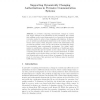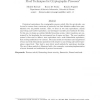894 search results - page 125 / 179 » Secure Implementation of Channel Abstractions |
154
click to vote
SPC
2005
Springer
15 years 8 months ago
2005
Springer
In pervasive computing environments, changes in context may trigger changes in an individual’s access permissions. We contend that existing access control frameworks do not provi...
111
click to vote
EUROCRYPT
2009
Springer
16 years 3 months ago
2009
Springer
A weak pseudorandom function (wPRF) is a cryptographic primitive similar to ? but weaker than ? a pseudorandom function: for wPRFs one only requires that the output is pseudorandom...
145
click to vote
ICQNM
2008
IEEE
15 years 9 months ago
2008
IEEE
Coin flipping is a cryptographic primitive in which two spatially separated players, who in principle do not trust each other, wish to establish a common random bit. If we limit ...
125
click to vote
LICS
1999
IEEE
15 years 6 months ago
1999
IEEE
Contextual equivalences for cryptographic process calculi, like the spi-calculus, can be used to reason about correctness of protocols, but their definition suffers from quantific...
162
click to vote
MA
1999
Springer
15 years 6 months ago
1999
Springer
Many real-world tasks can be decomposed into pipelines of sequential operations (where subtasks may themselves be composed of one or more pipelines). JGram is a framework enabling...


